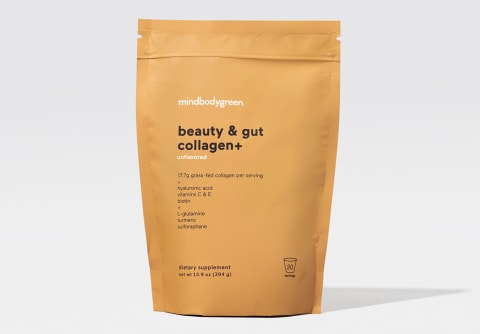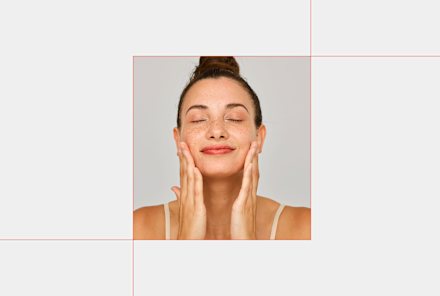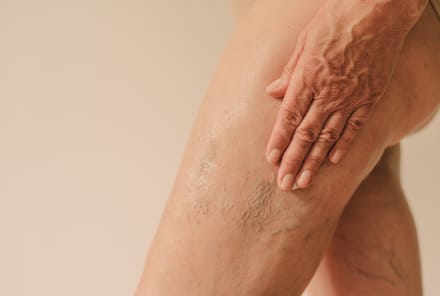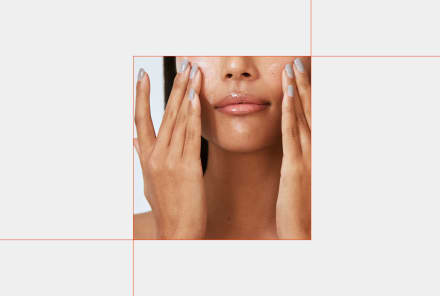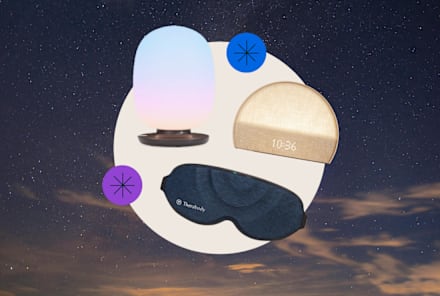Advertisement
Watch Out For This Advertising Trick In Skin Care, Says A Derm

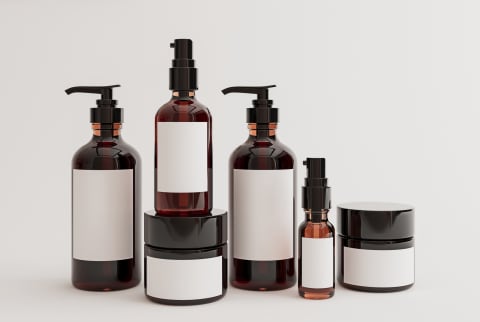
The term “collagen-infused” has been slapped on the front of all sorts of labels, from pricey boxed waters to protein bars to even topical skin care products. Hydrolyzed collagen peptides have been shown to encourage healthy skin aging when ingested, but does applying it on the skin mimic those effects? Here’s what research shows.
Do collagen serums work?
Once you hit around your mid-20s (the exact age varies from person to person), your collagen production decreases by about 1% each year1. So, yes, it’s a great idea to maintain the balance of production and degradation through supplementation, but this requires your body to absorb the collagen you’re feeding it.
Here’s the thing: In order for collagen-infused skin care products to work, the collagen molecules have to be able to actually enter the skin—which is where problem No. 1 comes into play. “Collagen is a huge molecule that sits on the surface of the skin and cannot be absorbed into the dermis," board-certified dermatologist Dendy Engelman, M.D. once told mbg.
Engelman further explains that this is a common marketing tactic in the skin care industry and confirms that any topical product with collagen in it will likely not provide the claimed benefits. Some topical active ingredients can stimulate your natural collagen production, but not by the same mechanism as layering collagen onto the skin.
According to research2, retinoids (including retinol, retinaldehyde, etc.) stimulate fibroblasts to synthesize collagen fibers and promote skin elasticity by removing degenerated elastin fibers and enhancing the production of new fibers. For this reason, it makes sense that retinol products often claim to stimulate collagen production, without promising to inject the skin with new collagen itself.
What to use instead.
As stated, retinoids (plus exfoliants, like glycolic acid) have the ability to stimulate collagen production and thus serve as a worthwhile topical ingredient for encouraging healthy skin aging. However, the only way to increase the actual collagen in your skin is not to layer it on but rather to ingest it.
This research review3 states that hydrolyzed collagen peptides can easily be absorbed (via the GI tract) into our bloodstream when ingested, serving as a safe and effective way to supplement natural collagen levels.* In that same review (and in other robust systematic reviews4 compiling evidence from many clinical trials), hydrolyzed collagen peptides have been shown to make the skin smoother, softer, and provide enhanced textural properties—meaning healthy skin aging isn’t the only complexion benefit.*
So it’s safe to say taking an oral collagen supplement is the way to go, rather than spending money on topical collagen products that won’t actually penetrate the skin. Be sure to look for something with hydrolyzed peptides, as that’s where the bulk of beneficial research comes from. If you don’t want to look high and low for a tried and tested product, let us recommend our superstar: mbg beauty & gut collagen+.
As a quick summary: This collagen supplement contains hydrolyzed peptides from grass-fed, pasture-raised cows. There’s a long list of other skin and gut-loving ingredients blended in to make it worthwhile.* A few of these include hyaluronic acid, biotin, vitamins C and E, and L-glutamine.
To sum up, "collagen serums" don’t actually work to promote collagen production or increase collagen at all, as they cannot penetrate the skin. Routinely ingesting hydrolyzed collagen peptides, however, has been shown to help promote the body's natural production of collagen1 and other proteins that make up the skin, like elastin and fibrillin.*
The takeaway.
Contrary to popular advertisement, collagen-infused skin care products will not penetrate the skin and thus do not provide support for internal collagen production. Orally consumed hydrolyzed collagen peptides have been shown to easily absorb into the body, thus supporting your natural collagen and elastin production, which can lead to healthy skin aging.* You can read up on the ins and outs of collagen supplementation here, including a few more underrated benefits.
4 Sources
Watch Next
Enjoy some of our favorite clips from classes
Enjoy some of our favorite clips from classes
What Is Meditation?
Mindfulness/Spirituality | Light Watkins
Box Breathing
Mindfulness/Spirituality | Gwen Dittmar
What Breathwork Can Address
Mindfulness/Spirituality | Gwen Dittmar
The 8 Limbs of Yoga - What is Asana?
Yoga | Caley Alyssa
Two Standing Postures to Open Up Tight Hips
Yoga | Caley Alyssa
How Plants Can Optimize Athletic Performance
Nutrition | Rich Roll
What to Eat Before a Workout
Nutrition | Rich Roll
How Ayurveda Helps Us Navigate Modern Life
Nutrition | Sahara Rose
Messages About Love & Relationships
Love & Relationships | Esther Perel
Love Languages
Love & Relationships | Esther Perel
